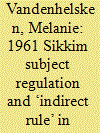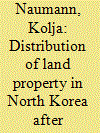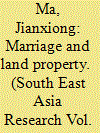| Srl | Item |
| 1 |
ID:
177553


|
|
|
|
|
| Summary/Abstract |
This paper discusses the principles behind the 1961 Sikkim Subject Regulation, the first citizenship law framed in Sikkim. It explores the historical construction of the entanglement of ‘ancestrality’ with land property and political membership, which is central to the issue of citizenship in Sikkim today. It shows how categories of citizens were formed in colonial and post-colonial time, in particular the division between ‘natives’ (Bhutia and Lepcha) and ‘settlers’ (Sikkimese Nepalis). With the revision of the Regulation in 1962, land property and ‘ancestral’ settlement became central criteria to acquire Sikkim Subject status. The paper shows how land property have become a materialisation of belonging to the place, and highlights the inequalities that the dependency created between insidedness and land property engendered. It also argues that a sole analysis of these inequalities in terms of ethnicity is insufficient by showing that other factors have taken part in forming them.
|
|
|
|
|
|
|
|
|
|
|
|
|
|
|
|
| 2 |
ID:
090097


|
|
|
|
|
| Publication |
2009.
|
| Summary/Abstract |
Transforming the North Korean economy into a viable economy based on individual liberty will pose some important problems. From a constitutional point of view, this paper analyzes different possibilities of property distribution in the North after reunification and discusses German experiences as a model for land distribution in North Korea. Possible property rights of citizens in the North and the South are examined. The paper proposes a pragmatic approach, enabling the political decision-makers to formulate solutions that will help the North Korean economy to recover.
|
|
|
|
|
|
|
|
|
|
|
|
|
|
|
|
| 3 |
ID:
111469


|
|
|
|
|
| Publication |
2011.
|
| Summary/Abstract |
This paper discusses how a social system based on bilateral and non-hierarchical kinship is able to establish and maintain systems of authority. The Muga Lahu in Yunnan practise a bilateral and non-lineal kinship system based on the gender equality principle, and communal life is also based on equal couples' kinship networking, bound to non-lineal ties through marriage. The Lahu here never practise matrilineal, patrilineal or cognatic kinship and descent in daily life, but an individual couple is bound to immediate ancestors through the redistribution of cropland property. In communal life, family separation and farmland reorganization are carried out dynamically through the marriages of the younger generation. The flexible kinship group establishes labour-sharing, ritual-participating and intermarriage groups in everyday life. Therefore, the kinship system is closely bound to farmland redistribution and the continuation of families. This bilateral, non-lineal kinship system constitutes a dynamic social institution, but all couples are equal to each other. Due to the lack of authority over the equality of social units such as equal couples, the Lahu communal authority historically comes from superior external powers, such as the religious power linked with religious movements involved in the Yunnan-Burma frontier formation since the 1720s. The established Lahu political system was destroyed by the coming of the Qing and the Republic states, because of its anti-Han or anti-state stance in frontier history. It is clear that the superior religious power over the kinship network worked as a means of social mobilization through religious movements, and became the authority source for social cohesion in history, but it has been replaced by state-appointed cadres in current communal life in China. The Lahu case shows that more attention should be paid to the relationships between frontier history, dynamic kinship and social organization among ethnic minorities in Chinese and South East Asian frontier societies.
|
|
|
|
|
|
|
|
|
|
|
|
|
|
|
|